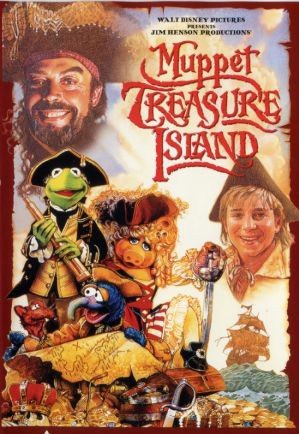Peter Canavese said in
his review, “The screenplay by Muppet vet Jerry Juhl, Kirk R. Thatcher (Muppets
Tonight) and James V. Hart (Bram Stoker's Dracula) works out wacky variations
on the strong frame of Stevenson's adventure. (Barry Mann and Cynthia Weil
provide added value with pirate-themed songs.)” This time, Gonzo and Rizzo are
barmen in the rundown bar of Mrs. Bluveridge, played by Jennifer Saunders.
Their kid, human, orphaned friend Jim Hawkins, played by a boring Kevin Bishop,
shares their musical dream of Something Better.
Something better
arrives in short order when evil drunk Billy Bones, played by Billy Connelly,
gives the three friends a treasure map promising great adventures. They win the
financial support of Squire Trelawney (Fozzie), a crazed person who believes a
friend named Mr. Bimbo lives in his finger, and soon they’re sailing on the Hispaniola, the captain being Abraham
Smollett (Kermit). The scurvy-looking team stirs little confidence: even
friendly ship’s chief Long John Silver, played by Tim Curry, having an
enjoyable time, seems a little too
friendly.
The songs Sailing
for Adventure, Cabin Fever, and Professional
Pirate gladly give pirate slang in funny epics to sailing. Miss Piggy
appears as Kermit’s old girlfriend Benjamina Gunn. Canavese said, “When the two
run afoul of Silver, Henson, Mann, and Weil literally turn the obligatory love
ballad upside-down in "Love Led Us Here" (taken seriously, over the
end credits, by dueting John Berry and Helen Darling). Mann and Weil's
"Love Power," as recorded by Ziggy Marley & the Melody Makers,
ends the film on some happy notes.”
The humor is up to
Muppet standard, with physical comedy, puns, running jokes, and layered gags. “He’s
some kind of a blind fiend!” says Rizzo of one scallywag. “I believe they
prefer ‘visually challenged’ fiend,” Gonzo replies. Canavese said, “Whenever
the movie threatens to take itself seriously for a moment, a gag deflates the
tone to happy silliness. In a running gag, a bunch of rats enjoy the
Hispaniola's journey as a pleasure cruise, Silver has a pet lobster named Polly
(you were expecting maybe a parrot?), and his henchman futilely attempt to
torture the masochistic Gonzo. As ever, winking asides remind kids that it's
only a movie.” “Muppet Treasure Island” is a great family entertainment.
Now we come to a
sequel, “Homeward Bound II: Lost in San Francisco,” released in 1996. The first
movie told the story of three pets, two dogs and a cat, who feel they have been
abandoned when their human owners puts them in their car and goes on a trip to
San Francisco. They escape, and return home through a mountain range, through
so many dangers, while surviving waterfalls and fighting mountain lions. Roger Ebert said in his review, “It was a pleasant movie and, for what it was, I
enjoyed it.”
Then we have this
sequel, where the human family decides to go on a camping trip, and the animals
are lost in the city. Ebert said, “That more or less exhausts the permutations,
I think, and I expect "Homeward Bound III" will send both humans and
animals to Alcatraz.”
The movie uses the
human characters only a little, at the beginning and end of the film. Ebert
said, “The rest of the time, we see and hear the animals, who are gifted with
human voices, and who talk without moving their mouths - by telepathy or
ventriloquy, I reckon.” The animals are Chance, the energetic youngster
(Michael J. Fox), Sassy, the particular cat (Sally Field), and Shadow, the wise
golden retriever (Ralph White replacing the late Don Ameche).
The animals don’t just
talk, they are Chatty Cathys. Ebert noted, “Chance in particular seems to have
learned the English language from old Jughead comic books, and says things
like, "Dogs rule, cats drool" and "OK, pal - you're toast!"”
At one part, Chance steals a Frisbee and uses it as an umbrella for his new
girlfriend from the rain, a similar deed that is far beyond your typical dog.
Ebert said, “These are not average dogs, however, and after watching them in
action for half an hour, I wondered why they didn't simply raise some money by
running a game of three-card monte on a street corner, and then taking a taxi
home.”
In the first film, the
pets went up against the dangers of nature. This time, the dangers of the big
city almost devastate them. They are followed everywhere by a couple of impolite
dogcatchers. Eventually they become friends with a pack of city dogs, who
obviously have city accents. The pack’s leader is Riley, voiced by Sinbad, who doesn’t
trust humans, and it is up to Shadow and Chance to explain that people can
sometimes be OK. There also is a love affair, between Chance and a city dog
named Delilah, voiced by Carla Gugino, who obviously does not have a city
accent. Ebert said, “I leave it to deeper thinkers than me to figure out what
the filmmakers are trying to tell us with these choices.”
Ebert continued, “My
own feeling is that I have had enough talking animals for the time being. The
first movie was good-hearted and I liked it, but since then "Babe"
has raised the bar, with animals that not only talk more realistically, but say
things that are wittier and more pungent.”
For those parents who
might remember Ed McMahon always arguing with Johnny Carson, pigs are smarter
than horses, so maybe they’re smarter than cats and dogs as well. They
definitely seem to have better agents.
I didn’t really like
this compared to the first movie because of Chance, and he was such a great dog
in the first movie. Don’t see this one.
Look out for more
excitement tomorrow in “Disney Live-Action Month.”


No comments:
Post a Comment